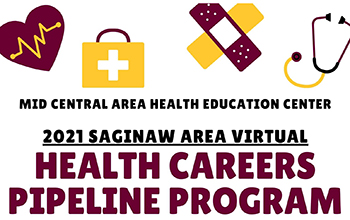Mid-Central Regional Center Update
Third annual Tribal Opioid Summit Attracts Over 250 attendees
 The Saginaw Chippewa Indian Tribe (SCIT) welcomed over 250 online attendees to the third annual Tribal Opioid Summit at the Soaring Eagle Casino & Resort on June 9, 2021.This year's theme was "Finding Solutions That Work."
The Saginaw Chippewa Indian Tribe (SCIT) welcomed over 250 online attendees to the third annual Tribal Opioid Summit at the Soaring Eagle Casino & Resort on June 9, 2021.This year's theme was "Finding Solutions That Work."
Dr. Nicholas Haddad, an infectious disease specialist with more than 20 years of experience in practicing adult medicine, was a lead keynote to begin the summit. Dr. Haddad has led coronavirus infection control efforts for the CMU community in Saginaw for patient care clinics, hospitals and our workplaces. The summit moved from the opening keynote to two tracks of workshops. Track one featured "Integrative Justice: A Healthcare Approach for Treatment Courts" with Judge Shannon and "Technological Advances of Telemedicine and Telehealth during a Pandemic" with Sethu Reddy, M.D., CMU College of Medicine. Track two featured "Challenges of Managing Opioid Use Disorder during the Pandemic Where are we at?" with Thersilla Oberbarnscheidt, M.D. PhD. University of Pittsburgh School of Medicine and "Mental Health Diagnosis and Treatment during a Pandemic" with Dr. Cara Poland, M.D., MSU College of Medicine.Dr. Poland is a board-certified physician specializing in addiction medicine and works as a consultant with the Saginaw Chippewa Tribal Court Healing to Wellness Program and Nimkee Memorial Wellness Center.
"The summit brought together individuals from different sectors and different perspectives. We all learn more when we broaden our perception and open our minds to other people," Dr. Poland said. "It was an honor to be involved in the summit and to continue to support the tribe and its medical providers."
April Osburn, MSA, Executive Director of the Michigan AHEC Mid-Central Regional Center, has been part of the planning committee for the past two conferences. "The Saginaw Chippewa Indian Tribe recognized a need and founded the concept of the "Tribal Opioid Summit," which is dedicated to the principles of information, education, and expanding knowledge of the devastating impact of the opioid crisis on local native and non-native communities," Osburn said. "The opportunity to sponsor such a large-scale conference dedicated to offering the latest in research, community development, healthcare, and tele-mental health resources was welcomed by the Mid Central AHEC and I'm honored to be involved in the planning process."
By Joseph V. Sowmick, Contributing Writer
Mid-Central Regional Center Health Career Pipeline Programs Adapt
During the Spring of 2021, fifteen 9th and 10th grade high school students from Saginaw County participated in the 2nd annual Saginaw Area Health Career Pipeline Program alongside health profession pursuing college mentors from Central Michigan University (CMU), Davenport University, Delta College and Saginaw Valley State University. This seven-week virtual program provided the opportunity for students to examine, through a variety of healthcare profession lenses, an example medical emergency response case study with current CMU College of Medicine student facilitators, experience basic clinical skills in their own homes using stethoscopes and blood pressure cuffs, virtually explore the Davenport University Lansing Campus Nursing Simulation Lab and discuss career fields with healthcare professionals from organizations across the state. MC AHEC staff were impressed by the participation and engagement of members throughout the program, and felt students greatly embraced virtual opportunities to supplement their own career exploration and development efforts during the ongoing pandemic effects on services offered. Positive evaluations and feedback about the program's influence on career goals and growth, beneficial mentorship groups, and overall session experiences revealed that participants were pleased with their experience.
Area Health Career Pipeline Program alongside health profession pursuing college mentors from Central Michigan University (CMU), Davenport University, Delta College and Saginaw Valley State University. This seven-week virtual program provided the opportunity for students to examine, through a variety of healthcare profession lenses, an example medical emergency response case study with current CMU College of Medicine student facilitators, experience basic clinical skills in their own homes using stethoscopes and blood pressure cuffs, virtually explore the Davenport University Lansing Campus Nursing Simulation Lab and discuss career fields with healthcare professionals from organizations across the state. MC AHEC staff were impressed by the participation and engagement of members throughout the program, and felt students greatly embraced virtual opportunities to supplement their own career exploration and development efforts during the ongoing pandemic effects on services offered. Positive evaluations and feedback about the program's influence on career goals and growth, beneficial mentorship groups, and overall session experiences revealed that participants were pleased with their experience.
Moving forward, the Mid-Central Area Health Education Center looks to host hybrid programs for both the Mt. Pleasant Area Fall 2021 and Saginaw Area Spring 2022 Health Career Pipeline Programs that merge the benefits of both in-person and virtual formats. With organizations and individuals becoming more accustomed to virtual technologies, the geographic, financial and timing constraints can be lessened, which allows for greater possibilities of showcasing unique spaces, careers and persons. Additionally, hybrid programming allows for opportunities to safely resume bringing persons together and sharing in memorable hands-on experiences again for those ready to do so. MC AHEC programming will continue to evolve as area communities adjust to the lasting impact of the pandemic and take newfound capabilities forward.
As part of the expanded possibilities being embraced via pandemic-influenced experiences, the Mid-Central Regional AHEC is also working to further develop opportunities with academic and community partners to offer additional engagement and growth opportunities for high school students interested in the health professions fields beyond the current Health Career Pipeline Programming. Prior program experiences and current collaborations have MC AHEC well suited to serve as an expanding bridge amongst the area's available academic programs, career opportunities and healthcare interested youth. While this initiative is in early planning stages, there are high hopes that additional offerings will be available and shared in upcoming newsletters soon.